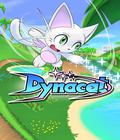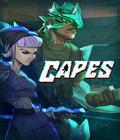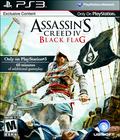When I reviewed Assassin's Creed III, I said that the naval combat was easily the game's high point. The naval battles were a mere side story to Connor's adventures, but they were more polished and interesting than anything else in AC3. I posited a naval-focused Assassin's Creed game could be enough to stand on its own, and I certainly wasn't alone in that sentiment. Ubisoft appears to have heard those comments because Assassin's Creed IV: Black Flag is exactly that: An Assassin's Creed focused on naval battles and the associated ship building. The result is quite possibly the best Assassin's Creed to date — if you don't care much about the actual assassinations.
Black Flag picks up shortly after AC3, and the game makes a very unusual perspective shift. You're a faceless protagonist who is working for Abstergo Entertainment — in conjunction with Ubisoft — to create the new Assassin's Creed game. To make the best possible game, both the player and the in-game character are charged with using the Animus device to delve into Desmond's genetic memories, in particular those of Connor's grandfather Edward Kenway, a famous pirate who sailed the Caribbean. The Assassins are still out there, and the trips into the Animus may not be all they seem ....
Black Flag's plot is odd because it feels like a self-parody. When you're playing as someone beta-testing the actual video game you're playing, the premise is quite silly. Edward learns to kill in five minutes while hoodwinking a group of Templars who think he's an ex-Assassin. There are several scenes which, in any other Assassin's Creed title, is where the plot gets into full swing, but Edward stands around and makes fun of the Templar/Assassin divide. In general, this goofiness works in the game's favor. Edward is a fun protagonist, and he's similar to Ezio but lacks some of the raw charm. Longtime fans of the franchise may be annoyed at the way the game mixes serious plot advancement with self-parody, but in comparison to the overly dour plot in AC3, this is a breath of fresh air.
The thing about AC4 that is likely to be most controversial is that it isn't much of an Assassin's Creed game. Some of the core mechanics are the same, and it takes place in the same world, but there's none of the same focus. If you expected to have an evolution of the same city-running, guard-escaping, heavy assassination gameplay that you found in AC2 and onward, you might be disappointed. Much of it is still there in some fashion or other, but the emphasis has changed dramatically. There are still plenty of parkour, swordplay, and viewpoints to synchronize, but they're done in a very different way.
You may play as Edward Kenway, but the star is his ship, the Jackdaw. AC4 brings the naval mechanics from AC3 and adds a bunch of improvements. You'll spend a lot of time traveling with the Jackdaw, and it is a dream to control. Each successive speed increase means you sacrifice maneuverability. You can also fast-travel to any port you've already visited. While traveling, you can use a spyglass to view distant objects. Highlight a landmass, and it provides its name and information about the collectibles. Highlight a ship, and you can see its name, political affiliation, cargo, and how difficult it would be to plunder. Your ship has a health bar and regenerates health when damaged, although you can turn this off if you'd like a challenge.
The map is huge, so you can go in any direction and find something to do, whether it's a plantation to rob, a Mayan puzzle to solve, a shipwreck to explore, a royal convoy to take over, and so on. There's a lot of empty blue ocean between each interesting item, but that means when you find something, it is meaningful. I was able to spend hours just completing tasks and exploring the world and was only delayed when I reached one of the few areas that are locked until I advanced the story. Even that was a minor problem because after a few hours into the game, roughly 95% of the world has been unlocked. Only a handful of islands remain out of reach until you advance.
Everything you do is meaningful, which is a huge improvement over AC3's lackluster side-quests. You need a lot of different materials to upgrade Edward and the Jackdaw, and you'll find them in almost everything you do. Hunt animals, and you can use the pelts to fashion new equipment for Edward, a la Far Cry 3. (Squeamish folks can just buy pelts from a trader.) If you want to upgrade the Jackdaw, you'll need to hunt down cloth and metal, which is carried by ships. Sometimes, you'll get rare swords, guns or armor for completing side-quests. The game constantly rewards you for looking around and doing things. My favorite collectible: The Sea Shanty pages, which will make your crew sing new songs as you travel the ocean.
In naval combat, you have four primary methods of attack: broadside, chain shot, flaming barrels, and mortars. Broadsides can only be fired from the port and starboard sides of your ship but are your best damage dealer. You can target them and fire a full barrage at a distance or use a close-range, unsighted heavy shot bombardment. Chain shot fires directly ahead and is weak but can slow or stun enemies. Flaming barrels are mines that you can drop behind your ship. Mortars are long-range bombardment tools you sight and target. Damaging an enemy lets you use a swivel gun to target their weak points. An early upgrade also lets you ram the enemy for additional damage. Enemies also follow the same rules, so if you can target an enemy from behind, you'll be safe from their bombardment but at risk from their fire barrels. You can ram the enemy, but you might get a ship full of heavy shot in return.
As a result, combat is about constantly switching between various tools. In one-on-one battles, you can get by with bombarding the enemy and watching them fall, but the tougher engagements involve fighting multiple heavily armed ships at once. You have to outfight and outmaneuver the enemy if you want to survive. A more heavily upgraded ship can crush multiple foes, but even a weaker ship can win fights with proper strategy and planning. The combat isn't terribly tough, but it rewards you for playing well. There are even legendary ships, which require serious tactics or a maxed-out Jackdaw to defeat since they're far more powerful than anything else at sea.
A defeated foe is not vanquished until you decide what to do with him. You can sink their ship, which instantly finishes them but earns less loot. Otherwise, you need to board their ship, which connects your two vessels and prompts your crew to hop over and start fighting. Meanwhile, Kenway must achieve an objective, such as killing a few enemy crew members or detonating the foe's powder stores. The longer you fight, the more crew members you lose, so there's a time limit for doing this (although it's very generous). Completing a boarding action earns you the full cargo and the option to salvage ship parts to repair the Jackdaw, reduce your wanted level, or go on trade missions. The option to just sink the enemy is a nice way to mix it up, so you don't dread boarding the enemy ship for the umpteenth time.
Some of the weakest parts of the title are ones that retain the older Assassin's Creed mechanics. On-foot combat still involves the same simple and button-mashy gameplay. You counter an enemy attack and proceed to instantly kill them. Sometimes, you have to counter and press the X button instead of Square. It feels smoother than in AC3, but it's really showing its age. Coming off the latest Batman game shows how much better the combat could be. There are some improvements, but they're mostly focused on shooting. You can carry up to four flintlock pistols and chain their shots to instantly kill four enemies. You can also use them to get headshots from a distance, which became my preferred method of assassinating enemies from afar. It's a fun additional mechanic, as long as you don't mind pulling an Indiana Jones and shooting the guy who brought a sword to the fight.
Assassination missions feel out of place. The game justifies the missions as the assassins hiring Edward to kill people for them. Who knew outsourcing had gotten that bad? The mechanics seem designed to be as low-effort and un-assassin-like as possible. I solved most of them by shooting a guy in the face. Likewise, the stealth missions almost feel like a parody of stealth missions in prior titles. If you need to eavesdrop on an enemy, you can hire dancers to make you invisible to all foes on the field. If you need to sneak by, you have a blowgun dart that can put enemies to sleep. Edward can easily force his way through any situation, and it's a lot more fun to play than AC3. They just underline that you're playing Pirate's Creed more than Assassin's Creed.
The in-game missions are a mixed bag. Some try too hard to force Assassin's Creed-style missions into sections that don't make sense. Others are wonderfully open and free. I snuck into a mansion to kill a corrupt slaver, and I can sneak and stab my way through, or I could blow my way in like a pirate. The game is at its worst when it forces you to play a certain way, and it's at its best when you can approach the missions however you'd like. Optional objectives return from the previous games but are better designed, and the pacing is way better. The game doesn't try to justify why Edward can do everything, but he can tree-run like Connor and assassinate like Ezio. It gets the player into the action without bogging down things.
The multiplayer introduced in AC: Brotherhood has returned, without a tremendous number of changes. The coolest new feature is the Game Lab mode, which allows players to create customized game modes. You can include which moves and abilities are allowed, the scoring for each type of kill, which HUD elements are allowed, and tons of other tweaks and elements. This is a particularly cool addition because it allows you to alter the game to make it fresh. Do you want a mode where nobody can use ranged weapons? Go for it. If you want a particularly crazy and violent game, you can all but remove ability cooldowns and give everyone a specific loadout. There's also a social media game built into AC4 that replaces the Assassin's Brotherhood from prior games. When you capture a ship, you can send it to your fleet before shipping it away on missions. If more friends play the game, the missions complete faster, and you can even find special boxes and hunting spots.
AC4 is a good-looking game, but it's pretty clear the developers are straining the limits of the system. There is a lot of pop-in and slowdowns, particularly during hectic sequences, and there are times when the system is laboring to keep up. A version of the game is coming out for the PS4 and Xbox One, and I suspect those iterations will run better. It doesn't run terribly, but it gives the strong impression that it was optimized for next-gen consoles. The voice acting is quite good, although the angry pirate routine sometimes descended into the realm of comedy. The soundtrack is top-notch. It's clearly inspired by "Pirates of the Caribbean," but it's hard to argue that it isn't fitting. As with all Assassin's Creed games, there were a few bugs, but they're not as serious as the constant glitches that pervaded AC3.
Assassin's Creed IV: Black Flag is simultaneously one of the best and worst Assassin's Creed games I've ever played. In terms of being an Assassin's Creed game, it strays pretty far from the mark, but in terms of being a fun game to play? It's one of the best the franchise has offered because it's fun to explore, fun to fight, and even fun to do the story missions. It has nagging flaws here and there, but none of them drag down the game. After the disappointing Assassin's Creed III, this is exactly the game the franchise needed. Longtime fans may be disappointed in the more naval-focused gameplay, but fans should enjoy the game's myriad of improvements. Even those who are new to the franchise and just looking for pirate-themed adventures should find this to be a very accessible and enjoyable title.
Score: 8.5/10
More articles about Assassin's Creed IV: Black Flag










 Building on the popular naval missions featured in AC III, Assassin's Creed IV: Black Flag is set in the 1700s during the Golden Age of Piracy, letting you roam the Caribbean islands as Edward Kenway, grandfather of AC III's main character Ratonhnhaké:ton, aka Connor.
Building on the popular naval missions featured in AC III, Assassin's Creed IV: Black Flag is set in the 1700s during the Golden Age of Piracy, letting you roam the Caribbean islands as Edward Kenway, grandfather of AC III's main character Ratonhnhaké:ton, aka Connor.










































